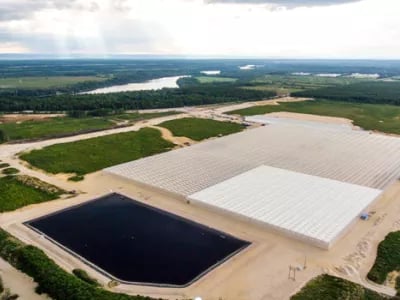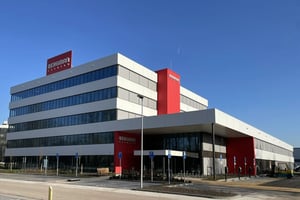NPM recently acquired a minority share in KUBO, a leading developer of high-tech greenhouses for horticulture. Wouter Kuiper, KUBO's CEO and the third generation in the family business, explains why the partnership with NPM is of enormous added value to the company, and what global developments are shaping the future of the greenhouse industry.
KUBO has been active in the greenhouse industry for over 75 years, and has grown on its own merits from a small, local family business into a company with 150 employees and foreign branches in Montreal and Shanghai. Why did you choose to move forward with an external investor?
“We have definitely not been idle, these last decades. But a number of developments have created the necessity for us to start playing in a different league, if I can put it in soccer terms. If we want to stay competitive, we need to grow faster and expand into other global markets. Such expansions not only take significant investment, but also require a further professionalisation of the entire organisation. NPM has hands-on experience developing international growth strategies, scaling up businesses and developing management teams. They also contribute expertise in the areas of compliance, legal services, and strategic scenarios and planning. All that is going to be highly valuable to us the coming years, if we are going to realise our ambition to grow into a globally leading player in state-of-the-art greenhouse concepts.”
Can you tell us more about the developments behind all this?
“It is becoming clear that our clients are operating on increasingly large scales, and the greenhouses are not just getting bigger, but also increasingly complex in terms of technology. In addition, a growing number of investors that are entering the market lack horticultural expertise themselves and look for turn-key solutions. Developing those solutions takes a serious amount of investment. And on top of that, the international market for greenhouses is expected to keep growing rapidly the coming decades, at an average rate of 10% annually. So not only will KUBO have to build larger and more complex greenhouses, but we will also have to deliver them in bigger numbers and in many more countries.”
Why is the international market for greenhouses growing so quickly?
“Around the world, there is a rapidly growing demand for high-quality and locally produced crops that are grown safely and efficiently under ideal climatological conditions, using limited energy, water and pesticides. The only way that can really be done, is by using high-tech greenhouses like the ones we build. And it is important to note that it is not just about the greenhouses; there is also demand for full support through software and services like training, data analysis, management expertise, and operational support and control. If we want to continue to feed a growing global population, agri-food technology is here to stay. Especially when you consider how climate change will impact the aggregate of arable land in the coming decades.”
Two years ago, KUBO was named the number 1 company in the Hillenraad100, the annual ranking of the hundred most prominent businesses in the highly knowledge- and capital-intensive Dutch (greenhouse) horticultural industry cluster. What was the reason for that?
“It was mostly a recognition of Pylot: a software program we developed that makes it possible to filter useful information out of the enormous data streams generated by greenhouse horticultural companies; for example through their climate systems. All that raw data is not necessarily valuable in itself, because it can be very difficult for humans to interpret. Pylot makes that interpretation crystal-clear. Data from climate control systems by different suppliers, generated at different times in different locations: all of it is made available and presented in real time. It can tell a grower exactly why the yield in one location is X, versus Y in a different location. That has many uses: output can be converted into input. And Pylot is also attractive for investors, giving them more confidence regarding their return on investment.”
Could we say that KUBO is evolving more and more from a greenhouse manufacturer to a provider of sustainable turn-key projects?
“That development has been going on for a decade or so, but you are quite right. And I think that this evolution will only accelerate in the coming decade. Especially in the areas of artificial intelligence and machine learning, groundbreaking concepts are on the horizon. At KUBO, we are already thinking about a greenhouse capable of making autonomous decisions about light, temperature, CO2, irrigation, and fertilisation. That would be a greenhouse that can deliver a consistently predictable output while requiring as little human intervention as possible. Right now, that is still a bit of a pipe dream, but we are headed in that direction.”
Finally: KUBO is a family business. Are you afraid of surrendering part of your identity with an external shareholder on board?
“KUBO is a family business and will stay a family business. Here is how I see it: we are now a family business with an investing partner. And we have selected that partner very carefully, based on their deep knowledge of our industry and their experience with other family businesses. NPM is well aware of the sensitivities that can play a role within a company like ours. And there is a strong cultural fit. The people at NPM are not just interested in the monthly figures; in my experience, they are very committed to learning about our organisation and what drives us as a company. You could say their mentality matches ours perfectly: we are going to succeed together.”
Read more: NPM Capital acquires stake in high-tech greenhouse constructor KUBO



.jpg?width=448&height=200&name=cybersecurity-privacy-protect-data%20(1).jpg)









